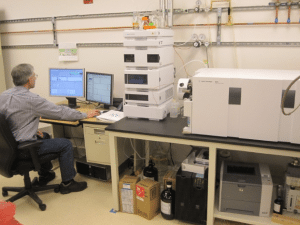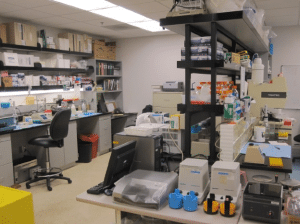For over 25 years, the Pharmacokinetics and Modeling Laboratory (PK Lab) has provided drug analysis to research communities of the University of Washington and Fred Hutchinson Cancer Research Center. The PK Lab has also collaborated with other institutions including Bastyr University, The Geneva Foundation, Oregon Health Sciences University, Seattle Children’s Hospital, St. Jude Children’s Research Hospital, and the University of Texas Southwest Medical Center.
At the present, the PK Lab supports clinical studies through the analysis of drugs in an array of biological matrices (e.g. plasma, urine, lymphocytes), along with analysis and modeling of pharmacokinetic-pharmacodynamic (PK-PD) data. The PK Lab also has the capability to conduct various studies for the in vitro characterization of drug metabolism and transport.
Description of services:

The Pharmacokinetics Laboratory can support both preclinical and clinical research protocols through the development and utilization of bioanalytical methods. Our core services, represented below, can be adapted to a variety of investigational objectives:
- Research project development and grant development, consultation and presentation of data
- Development and validation (according to FDA guidelines) of bioanalytical methods
- Routine, high throughput analtsis of drug metabolites at low concentrations in complex biological matrices
- Serum, plasma, whole blood, urine, lymphocytes, CSF, brain / spinal cord, and breath
- Pharmacokinetic modeling, ranging from noncompartmental analysis to full population pharmacokinetic analysis
- In vitro metabolic studies with tissue subcellular fractions and recombinant enzymes to characterize metabolite formation kinetics, identify drug-metabolizing enzymes, and drug-drug interactions
- Pharmacogenomics studies involving genotype-phenotype correlations
- PK-PD correlation studies with validated biomarkers
Ongoing research:
The PK Lab’s research activities have centered on the following areas:
- Enhancement of opioid analgesia
- Pharmacokinetics and pharmacodynamics of spinal opioids
- Cytochrome P450 (CYP) function in first-pass metabolism
- Identification of drug-drug and drug-herb interactions via CYP, UGT and Pgp enzymes
- Changes in pharmacokinetics and pharmacodynamics during pregnancy (collaboration with the UW Obstetric-Fetal Pharmacology Research Unit)
- Pharmacokinetics and pharmacodynamics of cyclophosphamide (collaboration with Children’s Oncology Group)
- Markers for oxidative stress in patients with Chronic Kidney Diseases (collaboration with Kidney Research Institute)
- Assessment of medication compliance using population pharmacokinetics (collaboration with Institute of Health Metrics and Evaluation)
